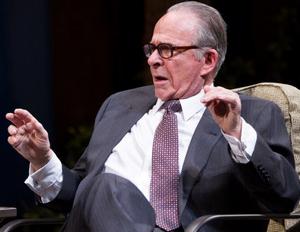SITE GUIDE
SEARCH
REVIEWS
REVIEW ARCHIVES
ADVERTISING AT CURTAINUP
FEATURES
NEWS
Etcetera and
Short Term Listings
LISTINGS
Broadway
Off-Broadway
NYC Restaurants
BOOKS and CDs
OTHER PLACES
Berkshires
London
California
New Jersey
DC
Connecticut
Philadelphia
Elsewhere
QUOTES
TKTS
PLAYWRIGHTS' ALBUMS
LETTERS TO EDITOR
FILM
LINKS
MISCELLANEOUS
Free Updates
Masthead
A CurtainUp DC Review
Camp David
|
I know we can't settle everything here, but at a minimum we want to leave with a treaty between Israel and Egypt and a process that would be the basis for a real resolution of the Palestinian question.— Jimmy Carter to Menachem Begin.
|

Ron Rifkin (Photo by
Teresa Wood)
|
The compromises President Carter, a deeply religious and decent person, patiently got from these very different men led to the 1978 Camp David Accords. The agreement took 13 agonizing days to achieve. Peace, at least for a while, seemed possible.
Wright's treatment of the historic facts is careful and comprehensive but this account is also partly fictional. What he has added is color, the human frailties of those concerned. The characters, who also include Jimmy Carter's wife Rosalynn, are very well drawn and acted. Hallie Foote as Rosalynn shows that the former First Lady was no pushover and that some of her suggestions to her husband and the Middle East leaders, exuded infinite common sense. Seeming at first to be not much more than a gracious Southern lady and expert hostess, the audience soon learns that this woman has a will of steel. Her advice to the men, particularly her husband, is ultimately well received.
Richard Thomas as Jimmy Carter bears a physical resemblance to President Carter but if you close your eyes his voice sounds like President Clinton. It's an artful performance.
The part of Anwar Sadat is played by Khaled Nabawy, an Egyptian actor and activist. Wright has treated him very fairly. The Egyptian leader's points are well taken, that compromising his country's position could mean he would be assassinated — especially in hindsight since that is exactly what happened.
As Menachem Begin, the Polish-born tough tough tough Israeli leader, Holocaust survivor, and father and grandfather of many children, Ron Rifkin gives a magnificent performance. He even looks like Begin though maybe it's the heavy-rimmed glasses, Jewish mannerisms and the Israeli inflection in his speech.
While all the performances are fine, it is Rifkin's Begin on which this play turns. His character is insufferably stubborn and yet he is the one who is the most moved and moving as the consequences of his actions unfold . One would not envy someone who had to deal with him. Rifkin's performance though is one that directors and audiences dream of – perfection.
Policy and foreign affairs wonks will probably find fault with some of the elements in Camp David, as they usually do when there is more than one way of looking at a historic event. For the rest of us Wright's play is an eye-opener on just how hard it is to bring different factions to the table and get them to agree on anything. Fortunately, there is some humor that makes all the wonkiness human.
Molly Smith's direction is firm and sharp. No element is overlooked. Walt Spangler's set evokes the simplicity of a cabin in the woods with three chairs, inside and outdoors for the three negotiators to sit in. Trees come and go, so do sunrises and sunsets—shout out to lighting designer Pat Collins. A loud and very realistic thunderstorm is the work of sound designer David Van Tieghem.
Even at ninety-minutes, Camp David did at times seem a bit long and a bit talky, but its arguments are well defined. In the audience last night, the play's world premiere, were President Jimmy Carter and First Lady Rosalynn Carter. I wonder whether they feel that the principles they were fighting for were well presented. Perhaps, like the negotiations at the time, that will be secret. Let's hope not.
|
Camp David By Lawrence Wright Directed by Molly Smith Cast: Hallie Foote (President Carter); Khaled Nabawy (Anwar Sadat); Ron Rifkin (Menachem Begin); Richard Thomas (Jimmy Carter) Running time: 90 minutes, no intermission. Arena Stage/Kreeger, 1101 Sixth Street, SW; Washington, DC; www.arenastage.org. Tickets: $55 to $110; 202-488-3300; March 21 to May 4, 2014. Review by Susan Davidson based on April 3, 2014 performance. REVIEW FEEDBACK Highlight one of the responses below and click "copy" or"CTRL+C"
Curtainup at Facebook . . . Curtainup at Twitter Subscribe to our FREE email updates: E-mail: esommer@curtainup.comesommer@curtainup.com put SUBSCRIBE CURTAINUP EMAIL UPDATE in the subject line and your full name and email address in the body of the message |

|


 Book of Mormon -CD
Book of Mormon -CD